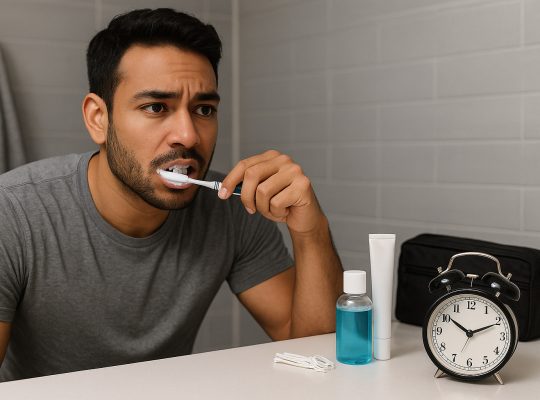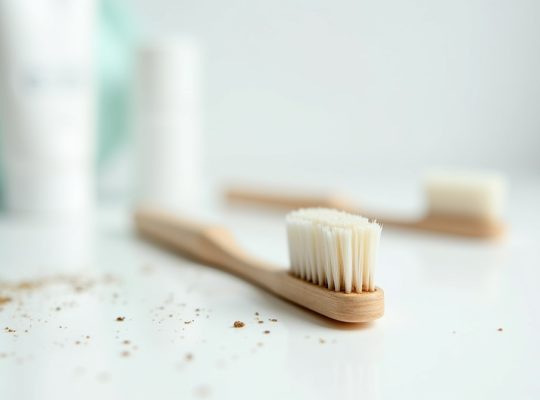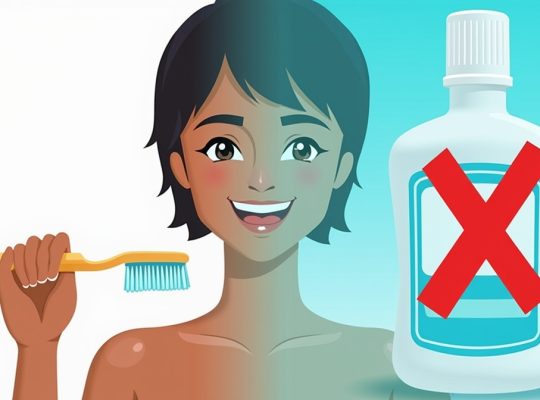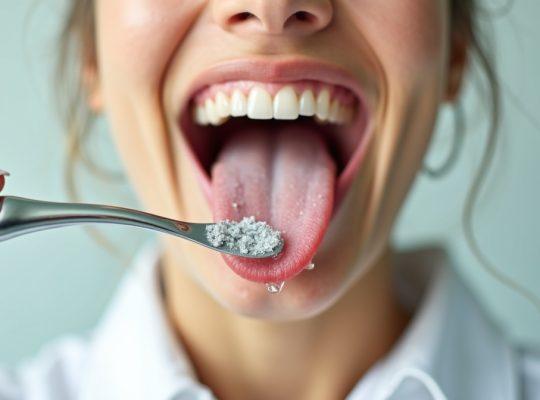Brushing twice a day is a standard recommendation, but if forced to choose between morning and night, nighttime brushing holds greater significance. While both play a role in maintaining oral health, brushing before bed removes accumulated plaque, bacteria, and food particles from the day, preventing overnight damage. Skipping this step allows bacteria to thrive, increasing the risk of cavities, gum disease, and bad breath.
Morning brushing, though essential for fresh breath and plaque removal, serves a different purpose. It primarily eliminates bacteria that accumulate overnight and freshens the mouth for the day ahead. While beneficial, it doesn’t hold the same preventive power as nighttime brushing.
Both are necessary for optimal oral health, but missing nighttime brushing has more severe consequences. Here’s why consistency in both routines matters and how they impact oral health differently.
The Science Behind Brushing Twice a Day
The mouth harbors millions of bacteria, including those responsible for cavities and gum disease. These bacteria feed on food particles, releasing acids that erode enamel and inflame gums. Brushing removes this buildup, preventing long-term damage.
Plaque, a sticky biofilm, forms constantly on teeth. Left unchecked, it hardens into tartar, leading to decay and gum disease. Brushing twice a day disrupts this cycle, but the timing affects its effectiveness.
Why Nighttime Brushing Matters More
Skipping nighttime brushing allows bacteria to feast undisturbed for hours. Saliva production slows during sleep, reducing its natural cleansing effect. Without intervention, acids accumulate, attacking enamel and creating an ideal environment for decay.
1. Prevents Acid Damage Overnight
Food debris and sugar left in the mouth overnight provide fuel for bacteria. Their byproducts lower pH levels, creating an acidic environment that weakens enamel. Brushing before bed removes these food sources, minimizing acid exposure.
2. Reduces Plaque Buildup
Plaque forms within hours of eating. If not removed, it hardens into tartar, which brushing alone cannot eliminate. Regular nighttime brushing disrupts this process, preventing tartar formation.
3. Protects Against Gum Disease
Gingivitis, the early stage of gum disease, develops when plaque irritates the gums. Overnight bacterial growth increases the risk of inflammation. Brushing before bed removes irritants, reducing the chance of swollen or bleeding gums.
4. Prevents Bad Breath
Bacteria thrive on leftover food particles, releasing sulfur compounds that cause bad breath. Skipping nighttime brushing allows these compounds to build up, leading to persistent morning breath.
Morning Brushing: Why It Still Matters
Though not as protective as nighttime brushing, morning brushing serves key functions. It prepares the mouth for the day by removing bacteria that accumulate overnight and refreshing breath.
1. Removes Overnight Bacterial Growth
Even with nighttime brushing, bacteria continue to multiply. Morning brushing eliminates this layer, reducing plaque formation and freshening the mouth.
2. Prevents Morning Breath
Morning breath results from bacterial activity during sleep. Brushing in the morning removes odor-causing compounds, improving breath freshness.
3. Boosts Saliva Production
Brushing stimulates saliva flow, which helps wash away bacteria and food particles throughout the day. Increased saliva also neutralizes acids, protecting enamel.
4. Enhances Fluoride Protection
Using a fluoride toothpaste in the morning provides additional enamel protection, strengthening teeth against acid attacks from food and drinks consumed during the day.
The Impact of Skipping a Brushing Session
Missing a single brushing session can lead to noticeable effects, especially if it becomes a habit.
Short-Term Effects
- Morning Skipping – Leads to bad breath and an increased bacterial load, making plaque more difficult to remove later.
- Night Skipping – Allows bacteria to thrive overnight, increasing acid exposure and plaque buildup.
Long-Term Effects
- Increased Cavities – Continuous acid exposure erodes enamel, leading to cavities.
- Gum Inflammation – Plaque buildup irritates gums, increasing the risk of gingivitis and periodontitis.
- Tartar Formation – Hardened plaque requires professional removal, contributing to gum disease.
- Persistent Bad Breath – Bacterial overgrowth leads to chronic halitosis, requiring more than brushing to resolve.
How to Maximize Oral Health Through Brushing
Brushing technique and habits matter as much as timing. Ensuring proper brushing methods prevents issues even if one session is occasionally missed.
1. Use the Right Technique
- Brush for two minutes using gentle, circular motions.
- Angle the brush at 45 degrees toward the gumline.
- Cover all surfaces, including the back of the teeth and tongue.
2. Choose a Fluoride Toothpaste
Fluoride strengthens enamel, helping resist acid attacks. Using it consistently provides long-term benefits.
3. Don’t Skip Flossing
Brushing alone cannot reach between teeth. Flossing removes plaque from tight spaces, preventing cavities and gum disease.
4. Avoid Rinsing Immediately After Brushing
Rinsing washes away fluoride before it fully absorbs. Spit out excess toothpaste but allow residual fluoride to remain for added protection.
5. Replace Your Toothbrush Regularly
A worn-out brush loses effectiveness. Replace it every three to four months or sooner if bristles fray.
Final Verdict: Night Brushing Is Non-Negotiable
While brushing in the morning freshens breath and removes bacteria, skipping nighttime brushing leads to more significant oral health issues. Bacteria multiply, acids erode enamel, and plaque hardens into tartar overnight. Prioritizing nighttime brushing prevents damage that cannot be undone the next morning.
Brushing twice daily remains the best approach, but if forced to choose, never skip the nighttime routine.






